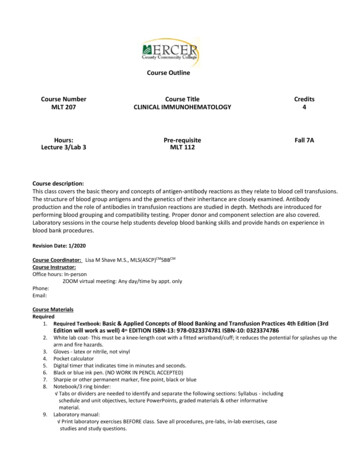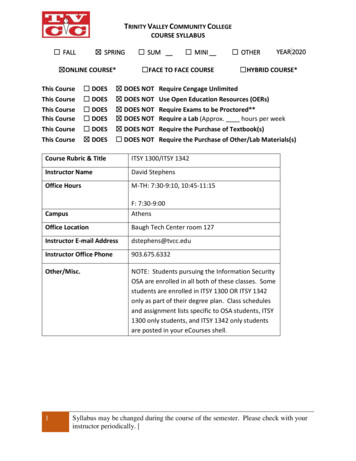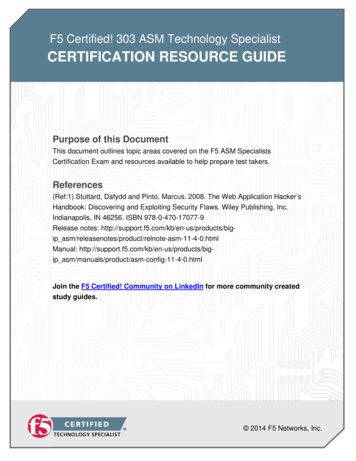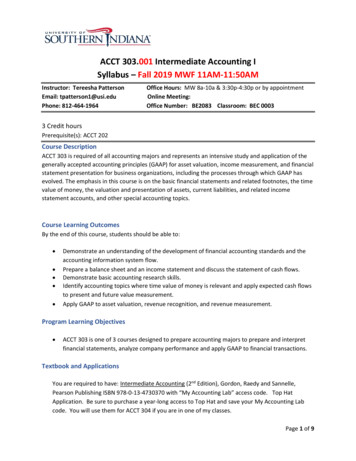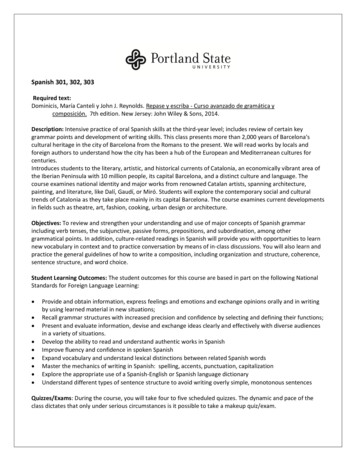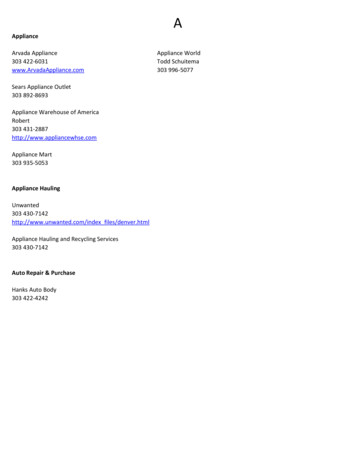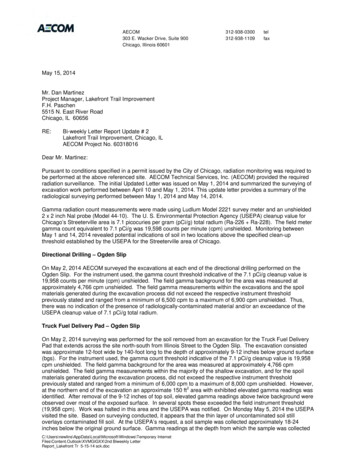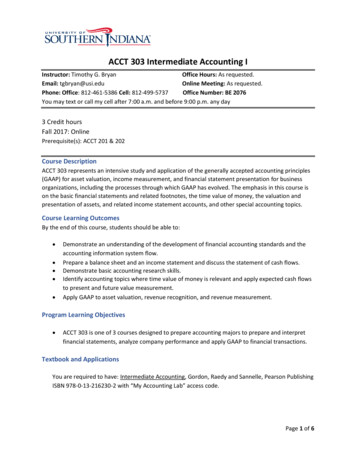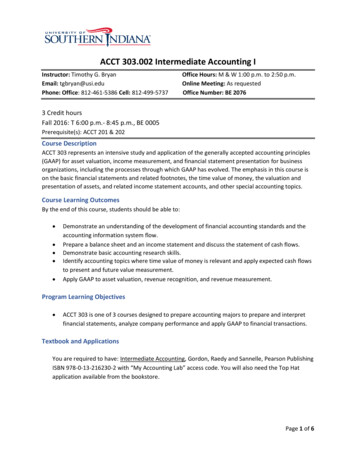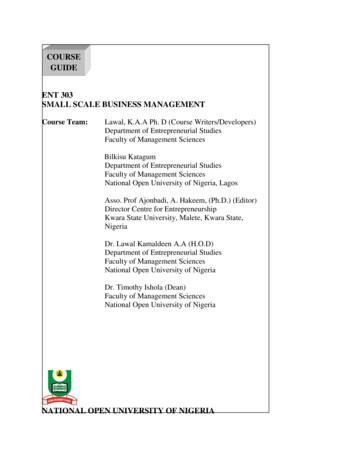
Transcription
COURSEGUIDEENT 303SMALL SCALE BUSINESS MANAGEMENTCourse Team:Lawal, K.A.A Ph. D (Course Writers/Developers)Department of Entrepreneurial StudiesFaculty of Management SciencesBilkisu KatagumDepartment of Entrepreneurial StudiesFaculty of Management SciencesNational Open University of Nigeria, LagosAsso. Prof Ajonbadi, A. Hakeem, (Ph.D.) (Editor)Director Centre for EntrepreneurshipKwara State University, Malete, Kwara State,NigeriaDr. Lawal Kamaldeen A.A (H.O.D)Department of Entrepreneurial StudiesFaculty of Management SciencesNational Open University of NigeriaDr. Timothy Ishola (Dean)Faculty of Management SciencesNational Open University of NigeriaNATIONAL OPEN UNIVERSITY OF NIGERIA
National Open University of NigeriaHeadquartersUniversity VillagePlot 91 Cadastral ZoneNnamdi Azikiwe ExpresswayJabi, Abuja.Lagos Office14/16 Ahmadu Bello WayVictoria Island, Lagose-mail: centralinfo@noun.edu.ngURL: www.noun.edu.ngPublished by:National Open University of NigeriaISBN:Printed: 2017All Rights Reserved
CONTENTSPAGEIntroduction .What you will learn in this Course .Course Aims .Objectives .Study Units Assignment Tutor-Marked Assignments .Final Examination and Grading Summary iiiivvviviviviiviivii
INTRODUCTIONThe course Small Scale Business Management (ENT 303) is a core course which carriestwo (2) credit units. It is prepared and made available to all undergraduate students inEntrepreneurship Programme, in the Faculty of Management Sciences/Department ofEntrepreneurial Studies. This course is a useful material to you in your academic pursuitas well as in your workplace as managers and administrators.WHAT YOU WILL LEARN IN THIS COURSEThe course is made up of twenty (20) units, covering areas such as: Scope and nature of Small Business ManagementBusiness goals and characteristics of Small Business enterprisesBasic concepts of ManagementManagement principles; Organizing, planning, staffing, controlling, directingfunctions in ManagementMarketing strategy and planning – definition of planning, importance of planningforms/kinds of planning and illustrate the flow of planning decision in a smallbusiness organisation master plan, role of marketing in small businessorganisation,Definition of strategy marketing and marketing task to an entrepreneur, stages inthe procedure of marketing strategy planning.Market analysis in selection of market posture, coordination and control ofbusiness activities strategy revision and continuity psychological barriers tomarketing strategy planningSources of information – definition internal and external source of information(Federal government and its agencies, state and local government as externalsources of informationElements of an information system, advantages and procedures involved indeveloping records retention programme, uses of some information tools such asmanuals, reports and forms,Ratio analysis and the limitations of ratio as a tool; budgeting and breakevenanalysis – definition, budgeting process problems of budgeting preparation, kindsof budgets and the importance of budgets administration;Illustrate how Break-Even chart is constructed, changes associated with the chartas any of the variables change.Nature of the Marketing Mix- Price, Product, Place and PromotionThe Course Guide is meant to provide you with the necessary information about thecourse, the nature of the materials you will be using and how to make the best use ofthem towards ensuring adequate success in your programme as well as the practice of
small business management in the society. Also included in this course guide isinformation on how to make use of your time and information on how to tackle the tutormarked assignment (TMA). There will be tutorial sessions during which your facilitatorwill take you through your difficult areas and at the same time have meaningfulinteraction with your fellow learners.The course consists of: Scope and nature of Small Business ManagementBusiness goals and characteristics of Small Business enterprisesBasic concepts of ManagementManagement principles; Organizing, planning, staffing, controlling, directingfunctions in ManagementMarketing strategy and planning – definition of planning, importance of planningforms/kinds of planning and illustrate the flow of planning decision in a smallbusiness organisation master plan, role of marketing in small businessorganisation. Definition of strategy marketing and marketing task to anentrepreneur, stages in the procedure of marketing strategy planning.Market analysis in selection of market posture, coordination and control ofbusiness activities strategy revision and continuity psychological barriers tomarketing strategy planningSources of information – definition internal and external source of information(Federal government and its agencies, state and local government as externalsources of informationElements of an information system, advantages and procedures involved indeveloping records retention programme, uses of some information tools such asmanuals, reports and forms,Ratio analysis and the limitations of ratio as a toolBudgeting and breakeven analysis – definition, budgeting process problems ofbudgeting preparation, kinds of budgets and the importance of budgetsadministration.Illustrate how Break-Even chart is constructed, changes associated with the chartas any of the variables change.Nature of the Marketing Mix- Price, Product, Place and PromotionCOURSE AIMS
The main aim of this course is to equip you with adequate information on the concept andnature of Small Scale Business Enterprises, its characteristics and its roles in aneconomy. The course also aims at making you have a greater understanding of theOBJECTIVESAt the end of this unit, you should be able to: explain the scope and nature of small business managementdescribe business goals and characteristics of small business enterprisesunderstand the basic concepts of managementdiscuss the management principles.Know how to develop a Marketing strategy and plan– definition of planning,importance of planning forms/kinds of planning and illustrate the flow of planningdecision in a small business organisation master plan, role of marketing in smallbusiness organisation.Understand the concept of Market analysis in selection of market posture,coordination and control of business activities strategy revision and continuitypsychological barriers to marketing strategy planningKnow the concept of a Sources of information – definition internal and externalsource of information (Federal government and its agencies, state and localgovernment as external sources of informationExplain the Elements of an information system, advantages and proceduresinvolved in developing records retention programme, uses of some informationtools such as manuals, reports and forms.Understand the nature of Ratio analysis and the limitations of ratio as a toolExplain and develop a budget and breakeven analysis – definition, budgetingprocess problems of budgeting preparation, kinds of budgets and the importance ofbudgets administration.Illustrate how Break-Even chart is constructed, changes associated with the chartas any of the variables change.Discuss the Nature and concept of the Marketing Mix- Price, Product, Place andPromotionCourse MaterialsMajor components of the course are: Course GuideStudy UnitsTextbooksAssignment Guide
STUDY UNITSThere are three modules of 17 units in this course, which should be studied carefully.MODULE 1Unit 1Unit 2Unit 3Unit 4Unit 5Unit 6;Management of Small BusinessCharacteristics and Business goals of Small Business EnterprisesNeed for Small Business EnterprisesBasic Concepts in ManagementManagement PrinciplesMarketing Strategy and PlanningMODULE 2Unit 7;Unit 8;Unit 9;Unit 10;Unit 11;Unit 12;Strategic marketing Planning ProcessMarket AnalysisMarketing Mix; Pricing Policies and StrategiesMarketing Mix; ProductMarketing Mix; Channels of DistributionMarketing Mix; PromotionMODULE 3Unit 13;Unit 14;Unit 15;Unit 16;Unit 17;Sources of InformationElements of an Information SystemRatio AnalysisBudgeting and Break-Even AnalysisBreak-Even ChartASSIGNMENT
There are many assignments in this course and you are expected to do all of them byfollowing the schedule prescribed for them in terms of when to attempt them and submitsame for grading by your Tutor.TUTOR-MARKED ASSIGNMENTSYou are expected to submit all the TMAs to your Tutor for grading on or before thestated deadline. If for any reason you cannot complete your assignment on time, contactyour tutor before the assignment is due, to discuss the possibility of extension. Extensionmay not be granted after the deadline, unless on exceptional cases. The TMAs usuallyconstitute 30% of the total score for the course.FINAL EXAMINATION AND GRADINGAt the end of the course, you will write the final examination. It will attract the remaining70%. This makes the total final score to be 100%.SUMMARYThis course, Small Scale Business Management (ENT 303) will expose you to issuesinvolved in small business management and its roles in the cooperative society. On thesuccessful completion of the course, you will have been armed with materials, expertiseand skills necessary for efficient and effective management of a small business enterprisein relation to the cooperative society.
MAINCONTENTTABLE OF CONTENTSMODULE 1Unit 1Unit 2Unit 3Unit 4Unit 5Unit 6;Management of Small BusinessCharacteristics and Business goals of Small Business EnterprisesNeed for Small Business EnterprisesBasic Concepts in ManagementManagement PrinciplesMarketing Strategy and PlanningMODULE 2Unit 7;Unit 8;Unit 9;Unit 10;Unit 11;Unit 12;Strategic marketing Planning ProcessMarket AnalysisMarketing Mix; Pricing Policies and StrategiesMarketing Mix; ProductMarketing Mix; Channels of DistributionMarketing Mix; PromotionMODULE 3Unit 13;Unit 14;Unit 15;Unit 16;Unit 17;Sources of InformationElements of an Information SystemRatio AnalysisBudgeting and Break-Even AnalysisBreak-Even Chart
MODULE 1Unit 1Unit 2Unit 3Unit 4Unit 5Unit 6;Management of Small BusinessCharacteristics and Business goals of Small Business EnterprisesNeed for Small Business EnterprisesBasic Concepts in ManagementManagement PrinciplesMarketing Strategy and PlanningUNIT 1 MANAGEMENT OF SMALL BUSINESSCONTENT1.0 Introduction2.0 Objectives3.0 Main Content3.1 Definition of Management and Small Business3.2 Nature of Small Scale Business3.3 Role of Management in a Business Decision4.0 Conclusion5.0 Summary6.0 Tutor-marked assignment7.0 References/Further Reading1.0 IntroductionIn this course (ENT 303), we will focus our attention on the process of establishing,organizing, managing and planning of a Small Scale Business. But to enable us toproceed and properly guide our thoughts, there is a need for us to understand the natureand concept of a Small Scale Business, and Management nature of a business decision.2.0 Objectives
At the end of this unit, you should be able to; Know the meaning of Management and Small Scale Business Understand the concept of Management and Small Scale Business Identify the role that the nature of management has in Business decision3.0 Main Content3.1 Definition of Management and Small BusinessBefore we give the definition of management, it is well to point out that one of the mostimportant activities of human beings is managing. And the idea of managing theresources of a group started even since human beings started coming together andworking in groups. This is important so that the objectives of the group can be attainedthrough proper linking of the various activities being performed by the group members.As organizations, particularly formal organization like business organizations, ministries,schools including universities become large the task of the manager starts getting biggerand more complex. And the aim of the manager is to promote excellence. Management isa word used by different people with varying meanings. The noun management is used asa collective noun to refer to all those who manage within a organization. That is why inan organization there are different people occupying different positions and seeing to itthat the resources of such organizations are put into effective use. There are also thosemanagers that assist other managers to perform their functions. They are all managers.The word management can also be used to separate a special class of people in anorganization from other classes. You should have heard such statement as, themanagement of the organization has taken a decision concerning the demand of theworkers for higher pay'. Such statement is referring to those people that take decisions,whether a temporal decision or a final decision.In trying to give a precise definition of management, it is always faced with problems.This is because of the interest and background of the person giving such definition. Theaccountant will like to see management in terms of cash flow: how much the organizationis expending in other to get revenue or returns, as well as the timing of such expenditureand revenue. The marketing manager sees Management in terms of analyzing theconsumer needs with a view to bring out a product or service capable of satisfying theneeds and at a profit to the organization. The personnel manager on his own interest willregard management as employing suitably qualified candidates to fill existing vacanciesand motivating them to work as a team toward the attainment of organizationalobjectives. We can go on and on.3.1.1 DefinitionWeihrich and Koontz say that management as a process is designing and maintaining anenvironment in which individuals, working together in groups, efficiently accomplish
selected aims. This is a basic definition which needs to be expanded in the followingway
Entrepreneurship Programme, in the Faculty of Management Sciences/Department of Entrepreneurial Studies. This course is a useful material to you in your academic pursuit as well as in your workplace as managers and administrators. WHAT YOU WILL LEARN IN THIS COURSE The course is made up of twenty (20) units, covering areas such as: Scope and nature of Small Business Management Business

